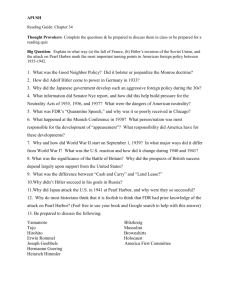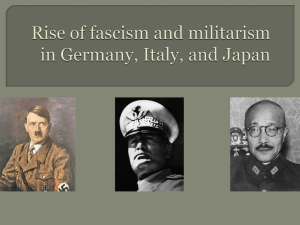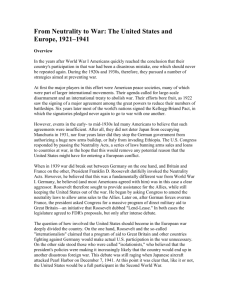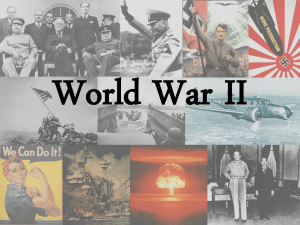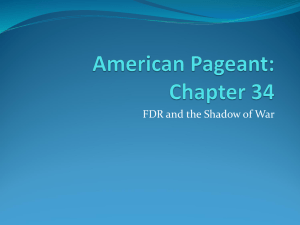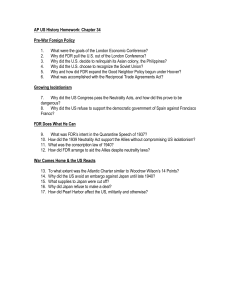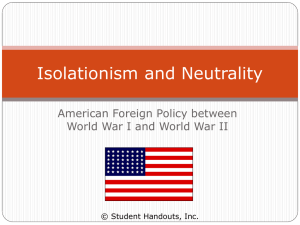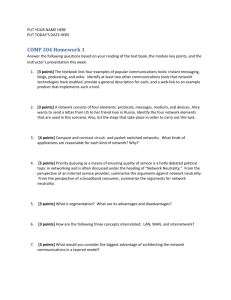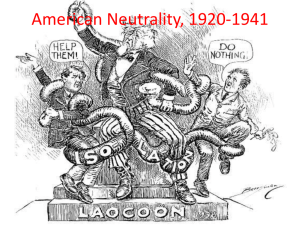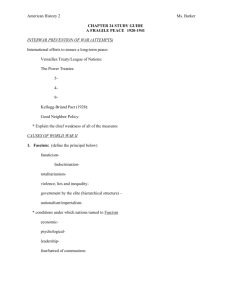Good Neighbor Policy Kellogg-Briand 1928 London
advertisement
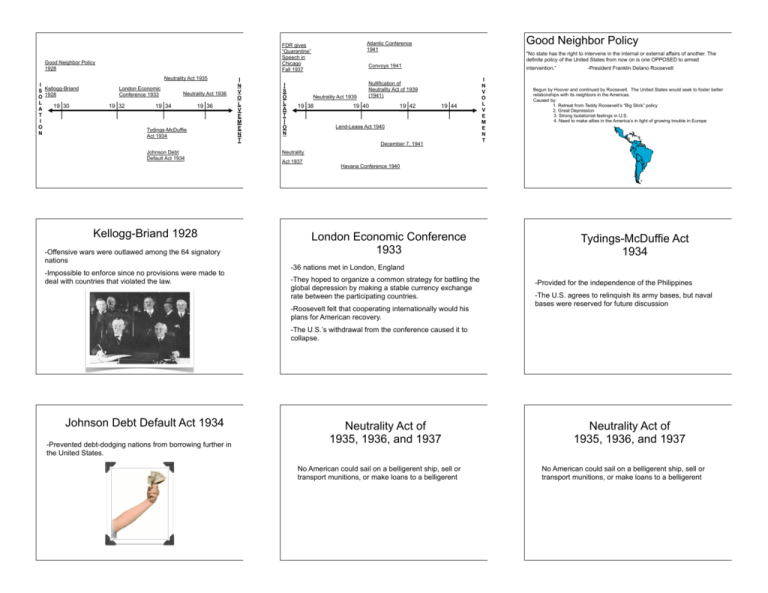
Good Neighbor Policy 1928 Neutrality Act 1935 I S Kellogg-Briand O 1928 L 19 30 A T I O N London Economic Conference 1933 19 32 Neutrality Act 1936 19 34 19 36 Tydings-McDuffie Act 1934 Johnson Debt Default Act 1934 Kellogg-Briand 1928 -Offensive wars were outlawed among the 64 signatory nations -Impossible to enforce since no provisions were made to deal with countries that violated the law. I N V O L V E M E N T I S O L A T I O N Good Neighbor Policy Atlantic Conference 1941 FDR gives “Quarantine” Speech in Chicago Fall 1937 "No state has the right to intervene in the internal or external affairs of another. The definite policy of the United States from now on is one OPPOSED to armed Convoys 1941 Neutrality Act 1939 19 38 intervention.” Nullification of Neutrality Act of 1939 (1941) 19 40 19 42 19 44 Lend-Lease Act 1940 December 7, 1941 I N V O L V E M E N T -President Franklin Delano Roosevelt Begun by Hoover and continued by Roosevelt. The United States would seek to foster better relationships with its neighbors in the Americas. Caused by: 1. Retreat from Teddy Roosevelt’s “Big Stick” policy 2. Great Depression 3. Strong Isolationist feelings in U.S. 4. Need to make allies in the America’s in light of growing trouble in Europe Neutrality Act 1937 Havana Conference 1940 London Economic Conference 1933 Tydings-McDuffie Act 1934 -36 nations met in London, England -They hoped to organize a common strategy for battling the global depression by making a stable currency exchange rate between the participating countries. -Roosevelt felt that cooperating internationally would his plans for American recovery. -Provided for the independence of the Philippines -The U.S. agrees to relinquish its army bases, but naval bases were reserved for future discussion -The U.S.’s withdrawal from the conference caused it to collapse. Johnson Debt Default Act 1934 -Prevented debt-dodging nations from borrowing further in the United States. Neutrality Act of 1935, 1936, and 1937 No American could sail on a belligerent ship, sell or transport munitions, or make loans to a belligerent Neutrality Act of 1935, 1936, and 1937 No American could sail on a belligerent ship, sell or transport munitions, or make loans to a belligerent Neutrality Act of 1939 “Cash-and-Carry” -Response to Hitler’s invasion of Poland -Any country could buy American munitions with cash, but then they would have to transport them with their own ships. Lend Lease Bill of 1940 -Effectively ended American neutrality -The U.S. would give massive supplies of armaments to countries being threatened by totalitarianism -The U.S. will become an “arsenal for democracy” -U.S. to “lend” 50 old destroyers in exchange for use of bases in Canada and the Caribbean Atlantic Conference, 1941 A secret meeting between FDR and Winston Churchill of England, on a warship off the coast of Newfoundland. Created Atlantic Charter which pledged that the United States and Britain would 1. Not expand themselves 2. Consult nations about territorial changes 3. Help people choose their own governments 4. Promote free trade -This avoided debt, loans, and torpedoing of American ships. 5. Disarm aggressive nations 6. Work towards a ‘permanent system of general security.’ not “Send guns, not Sons” Convoys 1941 Roosevelt issued orders to escort the lend-lease shipments to as far as Iceland, where the British would then take over. These convoys were perfect opportunities for Hitler to take target practice, as ships like the Greer, Kearny, and Reuben James were all hit by enemy U-boats. Nullification of Neutrality Act of 1939 (1941) With much public pressure, Congress voted in November of 1941 to nullify the now useless Neutrality Act of 1939. Merchant ships could now be legally armed and enter combat zones with munitions for Britain. This This?? to FDR’s “Quarantine Speech” -Delivered in Chicago, the “epicenter” of isolationism -Called for a “quarantine” of the disease of aggression -Roosevelt forced to retreat from this position by the vocal protests of isolationists Havana Conference “Restatement of the Monroe Doctrine” Countries of the Americas unite against European aggression FDR makes his Quarantine speech outdoors in Chicago, FDRL 1937/10/05 December 7, 1941 Also known as “Black Sunday,” when a surprise attack on Pearl Harbor, by the Japanese, killed 3,000 people Many planes and ships were destroyed making this date live in infamy. This action immediately propelled the United States into the war.

